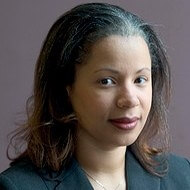News
CAMBRIDGE, Mass. - August 13, 2009 - Debra Auguste, Assistant Professor of Bioengineering at the Harvard School of Engineering and Applied Sciences (SEAS), was awarded a Defense Advanced Research Projects Agency (DARPA) Young Faculty Award.
She will use the $300,000 grant to support her project entitled, "Colloid Morphogenesis."
Her aim is to better understand how Nature uses a variety of chemical and mechanical signals to facilitate morphogenesis, or the development of cells into structures.
To investigate how such signals regulate shape and growth, Auguste will focus on how colloids (microspheres) self-assemble into two and three-dimensional geometries and how stimuli-sensitive colloids may be used to trigger transformations.
“Our approach does not model biology exactly but intends to mimic certain mechanical features as a result of volumetric contraction and expansion,” she says. “Similar to origami, many shapes can be formed through this technique given a framework of organizational rules, such as the number of colloids connected in a ring, the extent of deformation that may occur, or the number of particles that deform.”
Revealing the underlying general organizational principles for reliable global behavior in biological systems has important implications in biomedical engineering and device applications. In the future, medical devices may be engineered from materials that can interact with their environment. For example, chemical changes in the bloodstream may be used to trigger the expansion of stents that open narrowed blood vessels. Understanding how to mimic nature's ability to program large networks based on micron-sized, fundamental units is an exciting, multidisciplinary problem.
Auguste received her S.B. in Chemical Engineering from Massachusetts Institute of Technology in 1999 and her Ph.D. in Chemical Engineering from Princeton University in 2005. Before joining Harvard, she was a Post-Doctoral Associate at Massachusetts Institute of Technology from 2004 to 2006.
###
About the DARPA Young Faculty Award Program
The DARPA Young Faculty Award (YFA) program will identify and engage rising research stars in junior faculty positions in academia and expose them to Department of Defense (DoD) needs and DARPA's program development process. The YFA program will provide high-impact funding to these rising stars early in their careers in order to develop their research ideas in the context of DoD needs. The long term goal is to develop the next generation of academic scientists, engineers, and mathematicians in key disciplines who will focus a significant portion of their career on DoD and National Security issues.
Cutting-edge science delivered direct to your inbox.
Join the Harvard SEAS mailing list.
